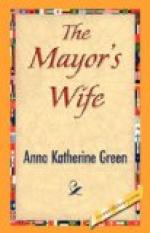[]; V; []; .>; V; [-]; <;
You have all read The Gold Bug, and know something of the method by which a solution is obtained by that simplest of all ciphers, where a fixed character takes the place of each letter in the alphabet.
Let us see if it applies to this one.
There are twenty-six letters in the English alphabet. Are there twenty-six or nearly twenty-six different characters, in the one hundred and one I find inscribed on the various slips spread out before me?
No, there are but fourteen. A check to begin with.
But wait; the dots make a difference. Let us increase the list by assuming that angles or squares thus marked are different letters from those of the same shape in which no dots or sketches occur, and we bring the list up to twenty. That is better.
The dotted or otherwise marked squares or angles are separate characters.
Now, which one of these appears most frequently? The square, which we have already decided must be either a or i. In the one short word or phrase we are at present considering, it occurs twice. Now supposing that this square stands for a, which according to Poe’s theory it should, a coming before s in the frequency in which it occurs in ordinary English sentences, how would the phrase look (still according to Poe) with dashes taking the place of the remaining unknown letters?
Thus
A-a —— if the whole is a single word.
A- a- — if the whole is a phrase. That it was a phrase I was convinced, possibly because one clings to so neat a theory as the one which makes the shading, so marked a feature in all the specimens before us, the sign of division into words. Let us take these seven characters as a phrase then and not as a word. What follows?
The dashes following the two a’s stand for letters, each of which should make a word when joined to a. What are these letters? Run over the alphabet and see. The only letters making sense when joined with a are h, m, n, s, t or x. Discarding the first and the last, we have these four words, am, an, as, at. Is it possible to start any intelligible phrase with any two of these arranged in any conceivable way? No. Then [] can not stand for a. Let us see if it does for i. The words of two letters headed by i we find to be if, in, is and it. A more promising collection than the first. One could easily start a phrase with any of these, even with any two of them such as If it, Is in, Is it, It is. [] is then the symbol of i, and some one of the above named combinations forms the beginning of the short phrase ending with a word of three letters symbolized by V [-] .<
What word?
If my reasoning is correct up to this point, it should not be hard to determine.




